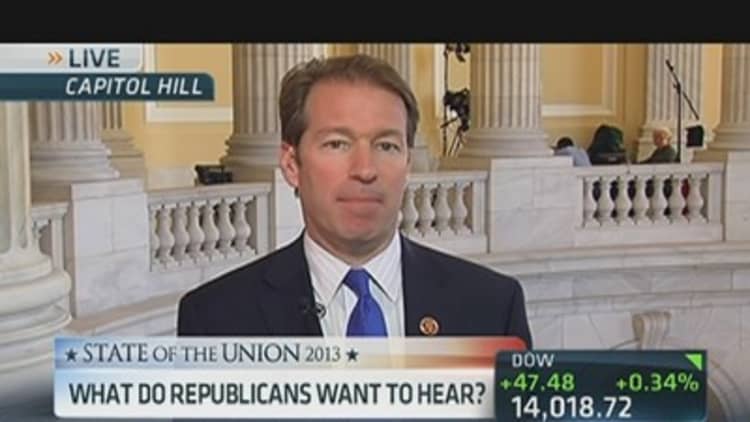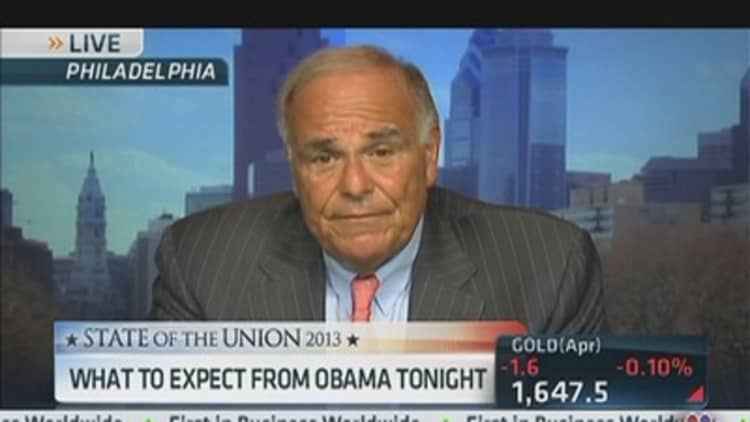U.S. investors have had plenty of reasons to worry about what goes on in Washington, from "fiscal cliff" fears to concerns about a debt default or government shutdown. But President Barack Obama's State of the Union address on Tuesday night is unlikely to be one of those reasons.
Unless Obama's speech is so combative that it heralds even uglier battles with Republicans over the budget, market strategists say, it is unlikely to derail a stock market rally that has pushed the S&P 500 index to just a few percentage points from all-time highs.
According to excerpts provided by the White House, the president will lay out a plan for economic growth in his speech, seeking to attract jobs from overseas and "reignite" the middle class.
"Every day, we should ask ourselves three questions as a nation: How do we attract more jobs to our shores? How do we equip our people with the skills needed to do those jobs? And how do we make sure that hard work leads to a decent living?" Obama will say.
The plan will be fully "paid for" and will not increase the deficit, Obama will say, according to the excerpts.

The president is expected to strike an optimistic note on the economy, highlighting the prospects of job growth. That should help maintain the positive tone in financial markets, analysts said, even though the White House and Congress still have to cut a deal to delay or modify "sequestration," the $85 billion in automatic spending cuts due in March.
"The apex of the political impact on the markets was reached at the end of the last year with the 'fiscal cliff' drama and soap opera," said James Dailey, portfolio manager at TEAM Asset Strategy Fund in Harrisburg, Pa.
"The built-in expectation right now is they will kick the can down the road again with the sequester," Dailey said.
Wall Street broadly sees the speech as an opportunity for the president to present long-term goals, many of which are unlikely to come to fruition.
The chances that Obama will announce concrete measures that will excite investors are viewed as slim, though he could give a nod to corporate tax reform, which carries the possibility of lower tax rates on the repatriation of overseas profits.
On the downside, Obama could suggest raising tax rates again to help close the deficit, or target tax benefits for specific industries such as oil and gas, or again mention eliminating the "carried interest" provision that reduces taxes for investment managers.

Some investors, after having jumped into riskier assets on the assumption that Washington will eventually work out a budget deal, are watching to see what tone Obama adopts for working with the Republicans.
If the president takes a combative approach, "this could provoke a short-term flight to safety, and see equity indices sell off by up to 1 percent as traders anticipate painful negotiations," said Karl Schamotta, senior strategist at Western Union Business Solutions in Calgary.
Watching Defense, Energy Stocks
Most State of the Union speeches see less than a 1 percent move in the stock market on the following day. The average move is only 0.15 percent since 1934, when President Franklin D. Roosevelt first used the term "State of the Union," according to Jeffrey Kleintop, chief market strategist at LPL Financial.
Still, stocks in the defense, retail and energy sectors could see some action, analysts say.
Under the current plan, defense spending will be cut by around 8 percent, while non-defense funding is subject to reductions of 5 to 6 percent, Kleintop said.
If Obama suggests he is open to mitigating the defense cuts, that would be a positive for the sector, which has pulled back lately. Shares of defense companies, such as Lockheed Martin and Raytheon, have recently fallen from 52-week highs in anticipation of budget cuts.
The energy sector is another focus. "Clean energy" companies could get a lift if Obama discusses energy independence, while any remarks on eliminating tax breaks for the exploration and production companies could hit shares of companies such as such as Anadarko Petroleum and ConocoPhillips.
The Jan. 1 deal that Washington struck on the fiscal cliff raised tax rates on the wealthiest Americans and allowed a previous reduction in the payroll tax to expire. That cuts into take-home pay for Americans, but is expected to hit lower- and middle-class citizens harder.
Rick Meckler, president of investment firm LibertyView Capital Management in Jersey City, N.J., said the bigger issue remains the fight on revenues, taxes and spending, which will have a direct impact on consumers.
The Morgan Stanley Retail Index recently hit a 52-week high, but some analysts see those stocks pulling back as consumers feel the effect of the increase in the payroll tax.

